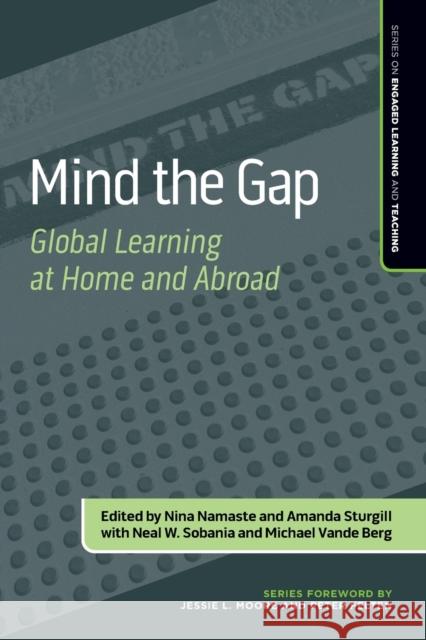Mind the Gap: Global Learning at Home and Abroad » książka



Mind the Gap: Global Learning at Home and Abroad
ISBN-13: 9781642670578 / Angielski / Miękka / 2020 / 230 str.
Mind the Gap: Global Learning at Home and Abroad
ISBN-13: 9781642670578 / Angielski / Miękka / 2020 / 230 str.
(netto: 148,00 VAT: 5%)
Najniższa cena z 30 dni: 151,07
ok. 22 dni roboczych
Dostawa w 2026 r.
Darmowa dostawa!
This book investigates not just student learning, but also faculty experiences, program structures, and pathways that impact global learning, and expands the context of global learning to show its antecedents and impacts as a part of the larger higher education experience.
"This opening volume of the Elon University Center for Engaged Learning and Stylus Series on Engaged Learning & Teaching covers more than international education. The authors define 'global engagement' broadly enough to make the book a kind of master key for unlocking many High-Impact Practices, and making full use of powerful educational experiences like encounters with difference, the dissonance of unfamiliar settings, and working through ambiguity. By organizing chapters with consistent attention to context, methodology, and application, the contributors have made this an easy book to use for practitioners at a range of levels and backgrounds. What results is more than a collection of perspectives on global engagement; it’s a role model for using reliable data, continuous faculty professional development, and rigorous learning outcomes assessment to tackle some of our most vexing questions."
Series Foreword—Jessie L. Moore and Peter Felten Preface. Global Competency. Where We’ve Been and Where We Need to Go—Neal W. Sobania and Michael Vande Berg Introduction—Nina Namaste and Amanda Sturgill Part One. Intent and Evidence in Designing Effective Global Learning Practices—Amanda Sturgill 1. Mapping Understandings of Global Engagement—Maureen Vandermaas-Peeler, Joan Ruelle, and Tim Peeples 2. Approaching Internationalization as an Ecosystem—Linda Drake Gobbo, Joseph G. HoffPart Two. Using Multi-Institutional Research on Study Away to Understand the Context of Gaps—Amanda Sturgill 3. When Does Global Learning Begin? Recognizing the Value of Student Experiences Prior to Study Abroad/Study Away—Scott Manning, Zachary Frieders, Lynette Bikos 4. Exploring Patterns of Student Global Learning Choices. A Multi-Institutional Analysis—Iris Berdrow, Rebecca Cruise, Ekaterina Levintova, Sabine Smith, Laura Boudon, Dan Paracka, and Paul M. Worley 5. Crossing Borders at Home. The Promise of Global Learning Close to Campus—Amanda Sturgill 6. Assessing Intercultural Competence in Student Writing. A Multi-Institutional Study—Melanie Rathburn, Jodi Malmgren, Ashley Brenner, Michael Carignan, Jane Hardy, and Andrea Paras 7. Up for the Challenge? The Role of Disorientation and Dissonance in Intercultural Learning—Andrea Paras and Lynne Mitchell 8. Global Competence Development. Blended Learning with the Constructivist Paradigm—Bert Vercamer, Linda Stuart, and Hazar Yildirim 9. Have Interest, Will NOT Travel. Unexpected Reasons Why Students Opt Out of International Study—Ekaterina Levintova, Sabine Smith, Rebecca Cruise, Iris Berdrow, Laura Boudon, Dan Paracka, Paul M. Worley 10. #FacultyMatter. Faculty Support and Interventions Integrated Into Global Learning—Prudence Layne, Sarah Glasco, Joan Gillespie, Dana Gross, Lisa JasinskiPart Three. Assessing Expanded Notions of Global Learning—Amanda Sturgill 11. Expanding the Perceptions and Realities of Global Learning. Connecting Disciplines Through Integrative Global Learning and Assessment—Darla K. Deardorff and Dawn Michele Whitehead 12. Assessing Global Competency Development in Diverse Learning Environments—Horane Holgate, Heidi Parker, and Charles A. Calahan 13. Opportunities and Challenges of Ethical, Effective Global Learning—Nina Namaste and Amanda Sturgill Epilogue. Global Learning as High-Quality Engaged Learning—Jessie L. Moore Appendix:Statement on Integrating Global Learning with the University Experience. Higher-Impact Study Abroad and Off-Campus Study Editors and Contributors Index
Nina Namaste is the Arts and Humanities Director for the Elon College Fellows.
Amanda Sturgill teaches in the interactive media graduate program at Elon University. Her research focuses on the intersection of education and community-based work, the relationship of religion and media and on new technologies and the news.
Neal W. Sobania is the Executive Director of the Wang Center for International Programs and Professor of History at Pacific Lutheran University, Tacoma, WA. As a teacher he has taught a wider range of courses in African history and African studies, and as an international educator has held many elected positions at both the regional and national level. He has been involved with Ethiopia for nearly forty years, first as a U.S. Peace Corps Volunteer, then a staff member, and now as an active scholar.
Michael Vande Berg is vice president for Academic Affairs at the Council on International Educational Exchange. He completed his PhD in comparative literature at the University of Illinois at Urbana–Champaign. He has held leadership positions at several institutions that are unusually committed to the international education of their students, including Georgetown University; the School for International Training; Michigan State University; Kalamazoo College; and el Instituto Internacional, in Madrid, Spain. Michael has authored a wide range of international education, intercultural relations, and comparative literature publications, including Spanish-to-English translations of two classics of 20th-century Spanish literature. He has been the principal investigator of several study abroad research projects, including the Georgetown Consortium Project; frequently consults with faculty and staff about international education topics; and leads intercultural workshops in the United States and abroad. A founding board member of the Forum on Education Abroad, he now serves as a senior faculty member of the Summer Institute for Intercultural Communication. Michael is also the recipient of The Forum on Education Abroad’s 2012 Peter A. Wollitzer award.
Jessie L. Moore is Director of the Center for Engaged Learning and Associate Professor of English: Professional Writing & Rhetoric. She leads planning, implementation, and assessment of the Center’s research seminars, which support multi-institutional inquiry on high-impact pedagogies and other focused engaged learning topics. Her recent research examines transfer of writing knowledge and practices, multi-institutional research and collaborative inquiry, writing residencies for faculty writers, the writing lives of university students, and high-impact pedagogies. She co-edited Critical Transitions: Writing and the Question of Transfer (2016). She currently serves as the elected Secretary of the Conference on College Composition and Communication.
1997-2025 DolnySlask.com Agencja Internetowa
KrainaKsiazek.PL - Księgarnia Internetowa









